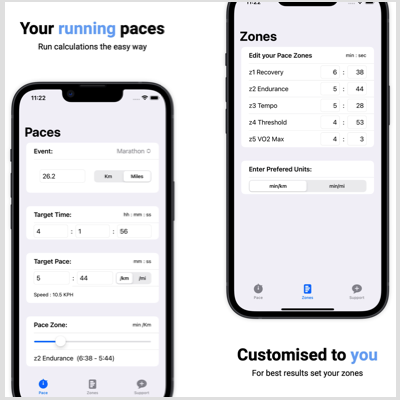Your cheat sheet to convert min/miles to min/km on paper is one thing, but the chances of you having it with you when you need it? Slim, tending to zero! Your phone on the other hand… Plus an app can customise data and work out all the other “essential running calculations”, us runners need. What pace to run for what time in 5km 10km, half marathon and marathon races. Plus by adding in your current 5k time, estimated race times can be tailored for you bey personal running zones.
Time to ditch the paper and pencil?
Confused by miles and kilometres? Switching from treadmills that have one metric, to the road in another and all at sea as to how your paces compare? Look no further: my running pace conversion app will sort all this out for you and more. You can work out exactly what pace you need to run to break a sub-20-minute 5k or a 4-hour marathon, and a whole lot more.
But first, a few important things to keep in mind …
What is a ‘good’ running pace per km?
Really, there’s no such thing as a ‘good’ pace unless, possibly, you are trying to qualify for the Olympics or a “Good For Age” race entry. What matters it what works for you. And your pace will vary hugely depending on your age, your sex, your experience, and a whole lot more. Try not to worry too much about your pace, given the number of factors outside your control, including fatigue, terrain and weather. What constitutes a good run pace for a new runner is very different to the average pace for an experienced runner. The beauty of running is that we are all at different stages of our running journey and working towards individual goals. But yet running remains something we can all enjoy together regardless of our “speed” differences.
What is the average pace per km for 5K?
For beginner runners, the average finishing time for a 5k is somewhere around the 30-45 minute mark. This might be a combination of running and walking initially as you build up your fitness and running capability.
For more experienced runners, who run regularly and perhaps also train specifically to get faster over the distance, the average finishing time might be between 20-25 minutes, with serious club runners recording times closer to 17 minutes and under.
Here are some of the most popular questions about running paces that my app solves:
What’s an 8 minute mile in km?
An 8 minute mile is equivalent to 4min 48secs per kilometre.
What pace do I need to run to break 2 hours for a half marathon?
To break two hours for 13.1 miles, you need to run at a pace of 9 mins 10sec per mile, or 5mins 41sec per kilometre. For a sub four hour marathon, you just need to do that twice.
What pace do I need to run for a sub-30 minute 5k?
The sub 30 5k is a relatively easy one in kilometre pace, at exactly 6mins per km. But if you work in miles, it’s the less mathematically pleasing pace of 9min 39secs per mile.
I originally wrote this app for myself as I think in kilometres but everyone else around me was talking in miles. I then had to estimate my finish time for half marathon race entry and… Well suffice to say that annoyed me enough to make me write an app so it would never annoy me again!
Ed Stivala – developer of Run Pace Calc
Run Pace Calc
So if you have a race coming up soon – perhaps a marathon or 10km, here’s what time you’d run your race in if you ran every mile/km at an even pace. And of course using “Zones” you can adapt a training plan or just figure out (easily!) how easy and Easy Pace Run should be
Run Pace Calc is available exclusively for iPhone and is available now from the Apple App Store.






